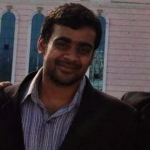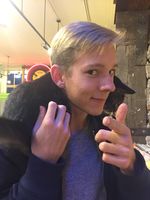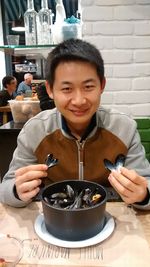Students: Difference between revisions
Chaohaiyang (talk | contribs) No edit summary |
Chaohaiyang (talk | contribs) |
||
| Line 110: | Line 110: | ||
[[File:Jacksen1.JPG|left|150px|]] | [[File:Jacksen1.JPG|left|150px|]] | ||
Jacksen Hugh Goyer (2019) | Jacksen Hugh Goyer (2019) | ||
| Line 119: | Line 118: | ||
jhgoyer@ku.edu | jhgoyer@ku.edu | ||
| Line 133: | Line 131: | ||
jmatt1998@ku.edu | jmatt1998@ku.edu | ||
===Undergraduate Students=== | ===Undergraduate Students=== | ||
Revision as of 20:53, 7 June 2020
Future students (Ph.D. Scholarship Opening for Spring 2021)
We have two Ph.D. research assistant openings in Spring 2021 on sensing, estimation, and control of aerial robots/UASs in the research group of Associate Prof. Haiyang Chao in the Aerospace Engineering Department at the University of Kansas. The successful candidates will work on developing optimal estimation algorithms and smart controllers for autonomous aerospace vehicles to operate in challenging conditions (e.g. wildfire).
Current research topics include:
(1) wind and turbulence sensing using single or multiple unmanned aircraft,
(2) collaborative estimation and control using a group of unmanned systems,
(3) disaster remote sensing using unmanned aircraft (e.g., wildfire, tornado/hail damage).
We offer:
(1) Great opportunities to work on aerial robot hardware and software to solve real world research problems on optimal estimation and control for next generation unmanned systems.
(2) You will have the chance to learn and play with high fidelity sensors (e.g., 5-hole probe, RTK GPS, thermal camera, 3D ultrasonic wind anemometer) and UAS platforms (Paparazzi and Pixhawk autopilot).
(3) Good salary and full tuition waiver as graduate research assistants.
Applicants should hold a B.S. or M.S. degree in related fields. Desired candidates should have strong background and interests in at least two of the following areas: (1) Controller theory & applications (e.g., PID/LQR) (2) Stochastic estimation filter design (e.g. EKF, UKF), (3) MATLAB/C programming & embedded systems. Students with experiences on Remote Controlled (RC) airplanes and Paparazzi /Pixhawk are especially welcomed to apply.
Please contact Associate Professor Haiyang Chao (chaohaiyangATku.edu) with (1) A paragraph in the main body of the email to summarize your related research experiences and your motivation to get a Ph.D. in our group, (2) Detailed CV, (3) TOEFL/GRE scores.
The KU Aerospace Engineering Program is ranked at 37th nationwide according to the U.S. News & World Report's America's Best Colleges, 2018 issue. Kansas hosts many large aircraft corporations including Cessna, Learjet, Hawker Beechcraft and Spirit AeroSystems, as well as other big companies including Sprint, Garmin.
Current students
Doctoral Students

Harold Flanagan (2016)
Ph.D. student
Department of Aerospace Engineering
h682f304@ku.edu

Saket Navalur Gowravaram (2018)
Ph.D. student
Department of Aerospace Engineering
saket_aero@ku.edu
Master Students

Jacksen Hugh Goyer (2019)
M.S. student
KU Aerospace Engineering
jhgoyer@ku.edu
Justin Matt (2020)
M.S. student
KU Aerospace Engineering
jmatt1998@ku.edu
Undergraduate Students
Justin Mat (2019 - now), Senior, KU Aerospace Engineering
Connor Liam Kinkade (2019 - now), Junior, KU Aerospace Engineering
Alumni

Pengzhi Tian (2014- 2020), Ph.D. KU Engineering. First Stop after Graduation: Cruise LLC. (http://pengzhitian.weebly.com/)
Nidhin Ninan (2018 - 2019), Senior, KU Aerospace Engineering
Jeremy Isaac Katz (2017 - 2018), B.S., KU Aerospace Engineering. First Stop after Graduation: Enviro Systems Inc.
Zorig Bat (2013), Senior, KU Aerospace Engineering.
Elizabeth S. O'Neil (2013 - 2014), B.S., KU Aerospace Engineering. First Stop after Graduation: Garmin.
Ying He (2015 - 2016), B.S.. KU Electrical Engineering. First Stop after Graduation: M.S. Student, University of Southern California.
Visiting Scholars
Dr. Guirong Wang (2015 - 2016), Associate Professor, China Jiliang University, Hangzhou, Zhejiang, China